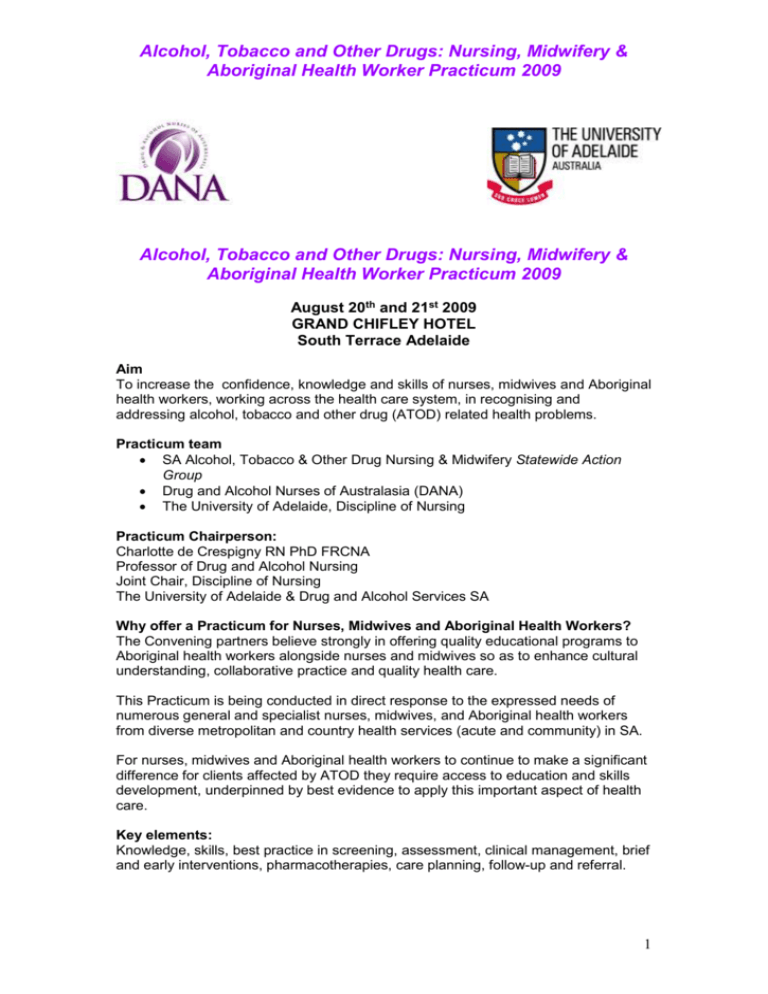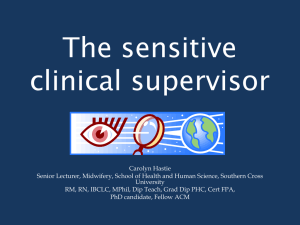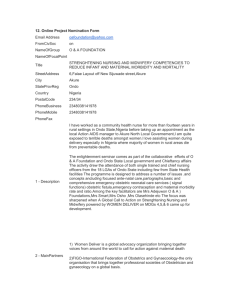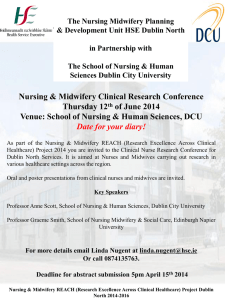Alcohol, Tobacco and Other Drugs Nursing and Midwifery Practicum
advertisement

Alcohol, Tobacco and Other Drugs: Nursing, Midwifery & Aboriginal Health Worker Practicum 2009 Alcohol, Tobacco and Other Drugs: Nursing, Midwifery & Aboriginal Health Worker Practicum 2009 August 20th and 21st 2009 GRAND CHIFLEY HOTEL South Terrace Adelaide Aim To increase the confidence, knowledge and skills of nurses, midwives and Aboriginal health workers, working across the health care system, in recognising and addressing alcohol, tobacco and other drug (ATOD) related health problems. Practicum team SA Alcohol, Tobacco & Other Drug Nursing & Midwifery Statewide Action Group Drug and Alcohol Nurses of Australasia (DANA) The University of Adelaide, Discipline of Nursing Practicum Chairperson: Charlotte de Crespigny RN PhD FRCNA Professor of Drug and Alcohol Nursing Joint Chair, Discipline of Nursing The University of Adelaide & Drug and Alcohol Services SA Why offer a Practicum for Nurses, Midwives and Aboriginal Health Workers? The Convening partners believe strongly in offering quality educational programs to Aboriginal health workers alongside nurses and midwives so as to enhance cultural understanding, collaborative practice and quality health care. This Practicum is being conducted in direct response to the expressed needs of numerous general and specialist nurses, midwives, and Aboriginal health workers from diverse metropolitan and country health services (acute and community) in SA. For nurses, midwives and Aboriginal health workers to continue to make a significant difference for clients affected by ATOD they require access to education and skills development, underpinned by best evidence to apply this important aspect of health care. Key elements: Knowledge, skills, best practice in screening, assessment, clinical management, brief and early interventions, pharmacotherapies, care planning, follow-up and referral. 1 Alcohol, Tobacco and Other Drugs: Nursing, Midwifery & Aboriginal Health Worker Practicum 2009 Keynote presentations and workshop streams: To ensure access to the required expertise, particular clinicians and educators are being invited to present and lead the clinical skills workshops. The speakers will be supported by their ‘Workshop Stream Facilitator’ from the convening team. The program will focus on clinical decision making and collaborative practice in relation to: 1. emergency presentations 2. adults with comorbidity 3. children and adolescents with comorbidity 4. management of intoxication and withdrawal 5. complex comorbidity in surgical/medical wards 6. acute and chronic pain management and addiction 7. working well with people from Aboriginal and diverse cultural backgrounds 8. antenatal, postnatal and neonatal presentations 9. hot topics - brain; nurse prescribing; using validated screening tools All participants will be provided with the PowerPoint presentations of all speakers and workshop facilitators, as well as best practice guidelines, resources and referral information. What will happen? The Practicum will be delivered over two days. The program will comprise concurrent streams of practice based workshops on issues that nurses, midwives and Aboriginal health workers have expressly asked for. There will also be key speakers and an ‘expert’ panel discussion. There will be a ‘Showcase’ of relevant tertiary and continuing education courses, health promotion resources, professional literature, community and self-help groups, specialist services, programs and resources that can inform and support nurses, midwives and Aboriginal health workers working with clients and families. There also will be many opportunities for networking, interaction and information sharing during the workshops, and at the Practicum dinner and breakfast. Evidence of Participation: All participants will receive certificates of participation for their professional portfolios. Additional resources: All participants will be given a suite of evidence based resources to take away as well as receive by mail a CDRom containing all keynote papers and workshop PowerPoint presentations after the practicum. Affordability: It is important that this Practicum is affordable and easily accessible for a wide range of nurses, midwives and Aboriginal health workers from urban, rural and remote areas. We are therefore keeping registration fees modest. Costs will be available by 31st March 2009. 2 Alcohol, Tobacco and Other Drugs: Nursing, Midwifery & Aboriginal Health Worker Practicum 2009 Venue: The venue is the Chifley Hotel on South Terrace Adelaide, which is a comfortable mid range venue with free parking, close to public transport and offers affordable accommodation and meals. For all registration and related inquires: Practicum Event organiser Sarah Scott Discipline of Nursing The University of Adelaide Email: sarah.scott@adelaide.edu.au For content related inquires: Practicum Convenor Charlotte de Crespigny Statewide Action Group and DANA Email: charlotte.decrespigny@adelaide.edu.au Practicum Co Convenor Peter Athanasos Statewide Action Group andDANA Email: peter.athanasos@adelaide.edu.au BACKGROUND INFORMATION In 2000 the Alcohol, Tobacco and Other Drug Nursing and Midwifery Statewide Action Group was established with the aim to guide and inform nursing and midwifery alcohol and other drug related practice and education in South Australia. Members are leaders and interested individuals from metropolitan and rural hospitals, community health, midwifery services, mental health, youth health, child and adolescent health, justice health, drug and alcohol, universities, Australian Nurses Federation (SA), and private mental health and drug and alcohol services. The Statewide Action Group has since worked steadily to boost the capacity of all nurses and midwives in recognising and responding to people with alcohol, tobacco and other drug related health conditions, wherever they present in the health care system. Some of the Groups’ achievements include: 1. Development and dissemination of the Alcohol, Tobacco and Other Drugs Guidelines: Framework for Policy, Standards & Clinical Guidelines for Nurses and Midwives 2003. Version 2. This resource is used in all public hospitals across SA, NT and WA. To view this package go to: www.dassa.sa.gov.au Professional Resources page 2. The First International Alcohol, Tobacco and Other Drug Nursing & Midwifery Conference: Making a World of Difference. 2003. Adelaide 3. Alcohol, Tobacco and Other Drugs Clinical Guidelines for Nurses and Midwives: Teaching Package 2007. To view this package go to: www.dassa.sa.gov.au Professional Resources page 4. Emergency mental health, alcohol and other drugs (EMHAD). Since 2002 this 3 day intensive training program has been delivered 8 times a year to nurses, midwives, Aboriginal health workers, Royal Flying Doctor Services, and medical students from metropolitan and rural emergency hospital and related services. 5. Alcohol, Tobacco and Other Drugs: Nursing, Midwifery & Aboriginal Health Worker Practicum 2009. 3 Alcohol, Tobacco and Other Drugs: Nursing, Midwifery & Aboriginal Health Worker Practicum 2009 4






